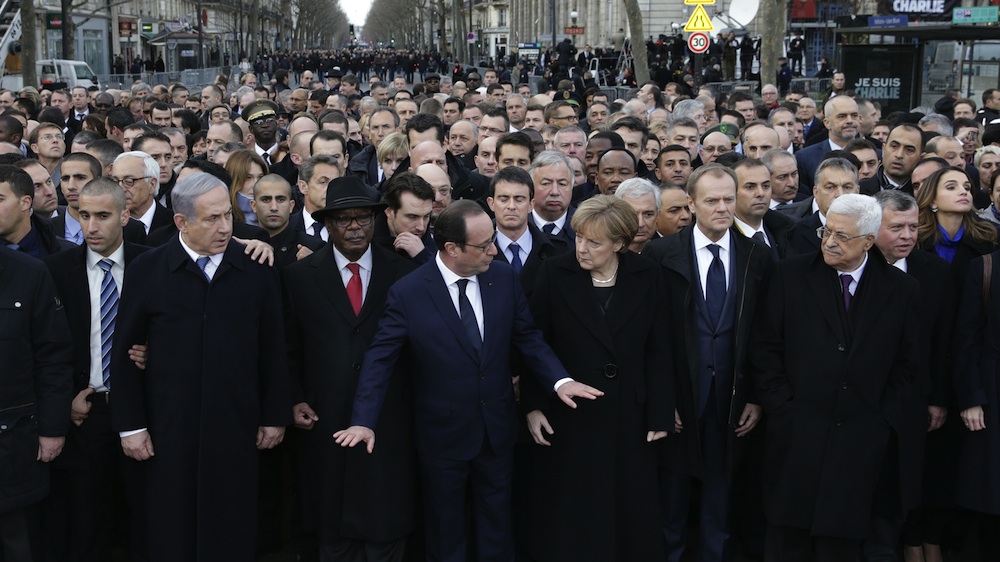Barack Obama’s absence at the great Paris rally for the victims of last week’s terrorist attacks may be symbolic of a deeper rift: Americans and Europeans have a completely different view of what it takes to combat terrorism. Germany’s Chancellor Angela Merkel declared that “Islam is part of Germany,” while US policy makers call for more security and surveillance. The killings at Charlie Hebdo may end up widening the transatlantic gap.
Last Sunday’s march in Paris was a great moment. Together with millions of French citizens, more than 50 leaders walked the streets of Paris to commemorate the victims of the terrorist attacks in Paris on January 7. Together, they showed support for a liberal, pluralistic society, for religious tolerance, and for the freedom of expression. There were heads of state and government from Africa and the Middle East who took part; even Russia’s Foreign Minister Sergei Lavrov and Ukraine’s President Petro Peroshenko joined in.
Conspicuously missing were the Americans. Not a single senior government official from Washington took part in the demonstration – not even Attorney General Eric Holder, who was already in Paris for a meeting with his EU counterparts. The lone American at the demonstration was Jane Hartley, the U.S. ambassador to France.
A day later and under domestic criticism, the White House was contrite. “I think it’s fair to say that we should have sent someone with a higher profile to be there,” US President Barack Obama’s spokesman Josh Earnest admitted. Secretary of State John Kerry hurried to change his scheduled visit to India to include a stopover in Paris.
America’s absence at the European rally reflects a higher truth, however: the gap between longtime allies has become very wide, and no policy has proven as divisive to both sides as the fight against terrorism. Whether discussing Guantánamo, targeted killings, CIA torture, or NSA surveillance, for most Europeans the United States have gone much too far in privileging security over human rights. In contrast, many Americans tend to see Europeans not just as naïve, but also as free-riding on the United States’ efforts.
For Europe, the attack on the satirical newspaper Charlie Hebdo may lead to a certain amount of reconsideration as far as security is concerned. In Germany, the debate on data retention has already resumed. As a less controversial measure, EU countries will probably impose tighter controls on their outer borders to prevent young Muslim extremists from joining the Islamic State in Syria, or from returning home unchecked.
However, the emphasis has not been on security, but on integration and fostering religious tolerance. The Paris march saw the heads of both France’s Jewish community and its Muslim community taking part together. In Germany, Chancellor Angela Merkel took a particularly clear stance: “Islam is part of Germany,” she said. “I am chancellor for all Germans, and that includes everybody who lives here permanently.”
Merkel, together with Federal President Joachim Gauck and most of her cabinet, also attended a rally in Berlin on Tuesday organized by Germany’s Muslims against hate and intolerance. She has spoken out very clearly against “Pegida”, an anti-Islam group that is organizing weekly demonstrations in Dresden.
In the United States, reflexes are different. After the Paris attacks, the Republican majority in both houses of Congress will almost certainly block any attempt to rein in the security services. The Chairman of the Senate Foreign Relations Committee, Bob Corker, said he expected there to be “less of a desire to hamstring” the NSA.
So what does this mean for transatlantic relations? As Omid Nouripour, a Green member of the Bundestag and a member of the German-American parliamentary association, told IP Journal: “It’s ambiguous. If the terrorist attacks in Paris mean that we, together with the Americans, will emphasize our open and pluralistic society, then this terrible event will have pulled us closer together.”
“But this won’t happen if the only result is the demand for closer cooperation of the intelligence services,” Nouripour, a harsh critic of the NSA surveillance practices, added. “In that case, it’s just a matter of time until the next informational mess will drive us apart even further.”







